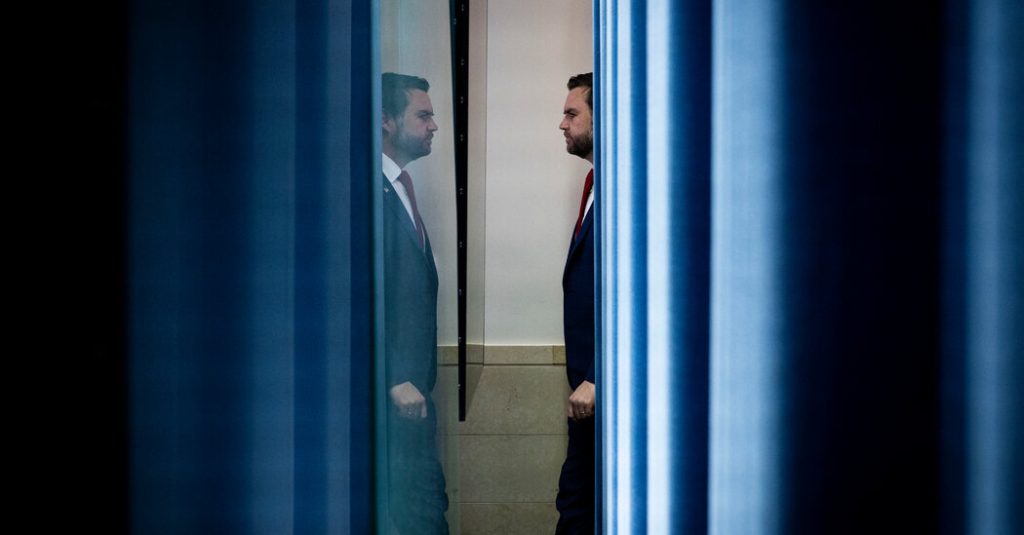The Assertion of Executive Power: JD Vance’s Warning to the Judiciary
Vice President JD Vance sparked significant debate on Sunday with a bold declaration aimed at the federal judiciary, asserting that "judges aren’t allowed to control the executive’s legitimate power." This statement, shared on social media, came in response to a series of court rulings that have temporarily halted key aspects of President Trump’s agenda. Among these actions are the termination of birthright citizenship, granting access to a sensitive Treasury Department system for associates of Elon Musk’s "Department of Government Efficiency" initiative, the transfer of transgender female inmates to male prisons, and the placement of thousands of U.S. Agency for International Development (USAID) employees on leave. Vance, a Yale Law School graduate, has long advocated for the idea that presidents like Trump should and can ignore court orders that infringe on what they deem to be their rightful executive authority. While his recent post did not explicitly call for defiance, it carried added weight given his current role as vice president, potentially offering a glimpse into the administration’s mindset toward judicial interference.
The Broader Context: Judicial Pushback and Executive Ambition
The Trump administration has faced numerous legal challenges, with federal judges consistently blocking its efforts to implement controversial policies. These rulings have not only delayed but also scrutinized the administration’s attempts to reshape the government and its policies. Vance’s statement, while not citing specific cases, aligns with broader criticism from Trump allies regarding recent judicial decisions. For instance, a court order barring Trump’s political appointees and Musk associates from accessing the Treasury Department’s payments system drew sharp rebuke from figures like Senator Tom Cotton of Arkansas, who labeled the ruling "outrageous" and referred to the judge as an "outlaw." Cotton, however, stopped short of advocating for outright defiance, instead calling for an immediate appeal. This reaction underscores the administration’s strategy of leveraging the courts to challenge and potentially overturn rulings it deems obstructive.
The Theoretical Underpinnings: Expanding Presidential Power
Vance’s stance on executive authority is rooted in a legal theory that emphasizes the primacy of the presidency over the judiciary, particularly in matters of national security and internal governance. His recent post echoed the sentiments of Harvard Law professor Adrian Vermeule, who argued that judicial interference with executive actions violates the separation of powers. Vermeule’s comments were appended to a post by Senator Cotton, amplifying the notion that the judiciary overstepped its bounds by meddling in the internal functioning of a co-equal branch of government. This perspective aligns with a broader strategy within the Trump administration to test the limits of executive power through legal challenges, potentially paving the way for the Supreme Court’s conservative majority to expand presidential authority by striking down certain statutes as unconstitutional.
The Escalating Legal Battles: A Constitutional Crisis in the Making
The Trump administration’s consistent disregard for legal boundaries has sparked intense speculation about its intentions. While some argue that the administration is strategically creating test cases to empower the Supreme Court to expand executive authority, others warn of a looming constitutional crisis. The central concern lies in the possibility that President Trump might begin ignoring unfavorable court decisions rather than appealing them. Such a move would precipitate a direct confrontation between the executive and judicial branches, challenging the foundational principle of judicial review. Vance’s rhetoric, while not explicitly endorsing defiance, has fueled this debate by framing judicial oversight as an overreach into executive prerogatives.
Historical Precedents: From Andrew Jackson to Modern-Day Implications
Vance’s arguments resonate with historical precedents, particularly the stance of former President Andrew Jackson, who famously defied a Supreme Court ruling by declaring, "The chief justice has made his ruling. Now let him enforce it." In a 2021 podcast appearance, Vance invoked this example, suggesting that a future Trump administration should emulate Jackson’s defiance when challenged by the courts. He also called for a sweeping purge of the federal bureaucracy, replacing career civil servants with loyalists, and dismissed the likelihood of successful legal pushback. This vision of executive power, unencumbered by judicial or legislative checks, has drawn comparisons to the expansive authority claimed by past presidents, such as George W. Bush, whose lawyers asserted that he could lawfully disregard congressional statutes in the name of national security.
The Debate Over Judicial Authority: A Clash of Constitutional Interpretations
At the heart of this debate lies a fundamental disagreement over the scope of executive power and the proper role of the judiciary in checking it. Vance and his allies argue that certain executive decisions, such as military operations or prosecutorial discretion, fall outside the purview of judicial review. This viewpoint contrasts sharply with the traditional understanding of the judiciary’s role in interpreting the law and ensuring that executive actions comply with constitutional and statutory limits. The growing frequency of courtroom clashes between the Trump administration and the judiciary raises profound questions about the balance of power in the U.S. government. As the administration continues to push the boundaries of executive authority, the nation may find itself at the precipice of a constitutional crisis, with the very fabric of its legal framework hanging in the balance.












